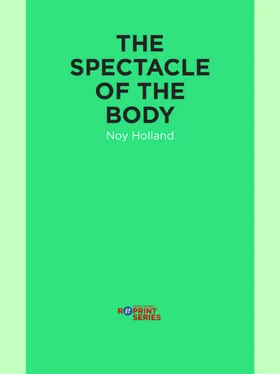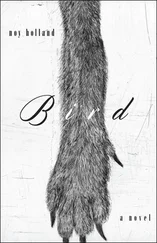It was the skin of the mare that had blued in the rain; her mane and her tail had not. Her tail had lifted over her back and the daughter had seen her winking, the pink clot of flesh as bright as the turned-up lid of an eye. Her father reached under the stallion, helping, guiding him, walking on two legs.
Was that her own smell, a smell not the smell of the mountain color or snakes that swam in the field? Was that the smell of her mother?
“Let me rest a minute,” the daughter said.
She could not see the water, but the slow shape of her mother raised up and the water was louder then. She said, more loudly now, “I get so worn down.”
“Me li ssa,” the mother said.
“I do,” said the daughter.
The gate trilled against its brace, opened but for the bottom edge the water curved past swiftly. The mother leaned into the rush of water.
“Pumpkin,” the mother said, “what about the horsies? If they cut off our water before we’re finished, what will the horsies do?”
“I don’t want to,” said the daughter. “I get so worn down.”
She was watching her legs, pulled along, hop and bob in the water.
“I hurt my hands,” she said. “See?”
When she let go of the weeds on the bank of the ditch to hold out her hands to her mother, the water pulled her down into the ditch to the waistband of her jeans. She giggled. They leaned together into the current.
The ditch cut the width of the field and past that was the boulevard and then came mountains. The water ran back to the mountains. Snow fell on the mountains and ran in the spring to the river and the river ran into the sea. In spring, the snow got smaller. Some days you could not notice it, but that did not make it not so. Unso , the daughter thought, Some of it stayed on the mountains — patches of white the daughter watched — to speckles, a shine in the eye — then nothing but the blank of stone. It would not happen if you watched it. One morning you would wake and see and it would be unso.
She went out along the ditch ahead of her mother, walking with the water. The water pressed her jeans against her faster than she would go.
Weeds that had come from the riverbed, pulled free in the flash of rain, caught on the mother’s legs when she walked; the weeds that grew in the stilted ditch broke loose and floated — mustard, the mother knew, and ragweed, goathead and loco. Her coat sleeves pulled long. The mother dipped her arms in the water, netting weeds with her hands — the skin of her hands blued to her. She had found them, waking, beside her, on the sheets in bed.
“Come on, the daughter said. “We’ve got to get these things open.”
There were half a dozen smaller gates to let water throughout the field. The mouths of the gates were narrow. In the weeds the horses would not eat were webs the yellow spiders built. The daughter could not see them, but she beat them down with her hand.
Water had broken inside the mare. It was different water — not like water for the field. The field water broke on stones as it came down the mountains. You could not hear a mare’s water breaking.
They had brought the mare to foal in a clean stall in the earth-walled barn — at night and in the rain also, for the rain, it seemed to the daughter, weakened the mare’s skin.
She had said, “You can see right into her.”
The mares milk veins had swelled blue in the rain or not, thick as a rope used to hobble. The daughter slept out in the feed room, so close she could hear the mare eating — sweet feed and warm bran mash, select flakes of alfalfa. It would only take keeping near the mare to know no harm would come.
Yet it had not surprised the daughter — that you could drown as the foal had drowned inside your own mother.
Hand and elbow, up to where the muscle hooked into his shoulder’s bone, the father had reached up into the mare to yank the foal out of the mare pinned against the paddock fence the daughter had pushed back into.
She was the daughter.
The places there were to go were the sounds of their names in her hand.
Ohio.
Armathwaite.
Wetumka.
Canarsie.
The women are still walking.
We expect when they reach the gate at the border of the field, something more will have happened. Something more should have been said.
Armathwaite.
Lady Jane — a gray name.
Canarsie.
Blue One was the name of her and — where the dead mare winched by her pasterns lay — a grassless place the horses, for whatever reason, stood. She was the sound their hooves made striking the dry field. She was the dry field.
“Uh-oh,” the mother said.
They walked stoppingly, held against the push of water. Behind them was the spoor of weeds they had netted with their hands.
“Penny,” said the daughter.
“Afraid.”
The dark shapes of the horses lunged out in the thudding field.
“Afraid?”
“I don’t know,” the mother said.
The daughter whinnied.
She cantered to school in the morning, practiced dressage in the courtyard.
Horsie, horsie, horsie.
When the horses ran, in their bellies you heard the break and slosh if you rode them. Her mother said that was not water. But it was a sound like water, a place to have tea parties in, a sound where toads at night froze into the gawk of swimming. You could wrench through water, pinch and suck and poke at it; it would never save it in the place that you had been.
There will be no words, Sister — but shape notes to sing out over our dead, over muddied field and boulevard, shopping malls and hospitals our mothers left for coffins. Oh what snare of our scars we claim of our mothers’ bodies, what sounds we have stitched ourselves into. Blame us, we beg, forgive us all thanks and grateful blessings due.
We are coming, Mother.
We will be there soon.
She will know us by our voices, our wild manes, by our splitting hooves.
Pay attention to what you are reading. My name is “Tommy Litz.” I was born in Columbus, Oh, 1962. I am 2-0-6. I am weak in a particular area. “Tommy.” Tommy Litz. Green-brown eyes. Gentle. I was interesting in Mildred until she died. We talked of one thing and another.
1145 Three Degree Drive.
Do not be so nervous. Do not be afraid, “Tommy Litz.”
Do you know Mikuni-san’s warmhearted character?
This is great to meet you with love, wishing you are well of health together with your family. I would like to know more about you and the weather of your country.
As for now, I was wishing something. I am a quality single. I drive a Dodge PU. Please. (Do not be afraid, ladies.. If you are afraid, try thinking: “Tommy, Tommy Litz.”) Please remain subdued. If you are a large lady, I ask you to consider what you have just read.
P.S. I cramp James Brown. I am the original James Brown.
Pay attention to what you are reading. Pay attention to what you are reading. What you don’t understand, please ask.
From,
Tommy (Litz)
Lovelies,
I got drarwrings, etc.
With God’s help, I think to make efforts to go ahead and do not let my family down. I love it so much.
As for now, I am in the agropecuary fair together with a with a beautiful horse parade going by the street (thanks God).
Do you care much for horse parades?
Guess who had the beautiful baby which is 9 mos.?
(There are many questions I would like to ask of you and they are nine of my business, except that I care for you and feel I am one of the last links we have of each other.)
1145 Three Degree Drive.
As for Tommy (doo-wop Brown), English has been mastered.
I am a quality civilian, born in 1952. Dodge PU. HELL NO, T. LITZ WON’T GO! (It is regrettable for me to make sure how people are thinking of the situation under the war, actually.)
Читать дальше











